Top Rankings
Satanta School District ranks among the top 20% of public school district in Kansas for:
Category
Attribute
Diversity
Most diverse schools (Top 1%)
Student Attention
Lowest student:teacher ratio (Top 1%)
For the 2025 school year, there is 1 public middle school serving 114 students in Satanta School District. This district's average middle testing ranking is 2/10, which is in the bottom 50% of public middle schools in Kansas.
Public Middle School in Satanta School District have an average math proficiency score of 17% (versus the Kansas public middle school average of 24%), and reading proficiency score of 17% (versus the 28% statewide average).
Minority enrollment is 58% of the student body (majority Hispanic), which is more than the Kansas public middle school average of 35% (majority Hispanic).
Overview
This School District
This State (KS)
# Schools
2 Schools
444 Schools
# Students
244 Students
135,097 Students
# Teachers
26 Teachers
9,658 Teachers
Student : Teacher Ratio
9:1
9:1
District Rank
Satanta School District, which is ranked within the bottom 50% of all 286 school districts in Kansas (based off of combined math and reading proficiency testing data) for the 2021-2022 school year.
The school district's graduation rate of 80% has stayed relatively flat over five school years.
Overall District Rank
#214 out of 286 school districts
(Bottom 50%)
(Bottom 50%)
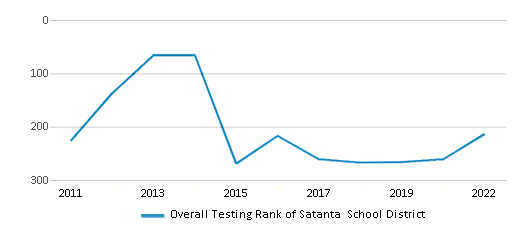
Math Test Scores (% Proficient)
20-24%
29%
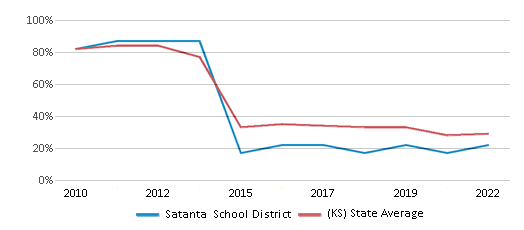
Reading/Language Arts Test Scores (% Proficient)
25-29%
32%
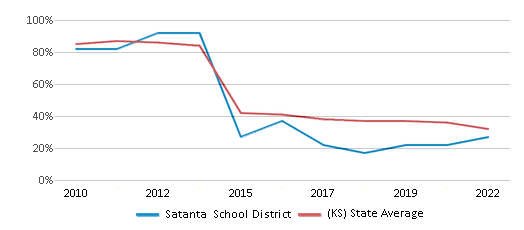
Science Test Scores (% Proficient)
20-29%
31%
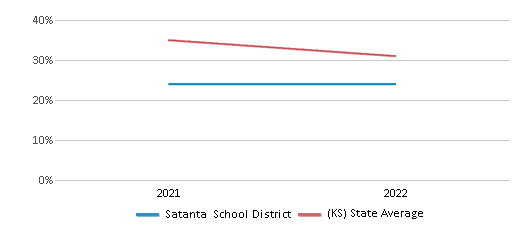
Graduation Rate
≥80%
89%
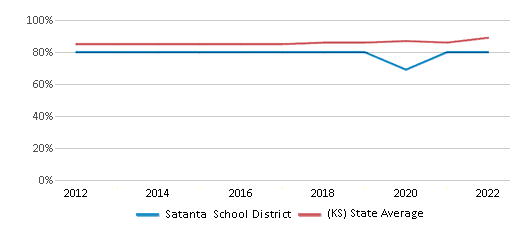
Students by Ethnicity:
Diversity Score
0.52
0.54
# American Indian Students
n/a
1,123 Students
% American Indian Students
n/a
1%
# Asian Students
n/a
3,384 Students
% Asian Students
n/a
2%
# Hispanic Students
124 Students
26,977 Students
% Hispanic Students
51%
20%
# Black Students
4 Students
7,995 Students
% Black Students
2%
6%
# White Students
115 Students
87,589 Students
% White Students
47%
65%
# Hawaiian Students
n/a
288 Students
% Hawaiian Students
n/a
n/a
# Two or more races Students
1 Student
7,741 Students
% of Two or more races Students
n/a
6%
Students by Grade:
# Students in PK Grade:
22
1,187
# Students in K Grade:
21
1,373
# Students in 1st Grade:
20
1,723
# Students in 2nd Grade:
15
1,821
# Students in 3rd Grade:
16
1,853
# Students in 4th Grade:
17
2,318
# Students in 5th Grade:
19
3,889
# Students in 6th Grade:
13
26,331
# Students in 7th Grade:
12
35,096
# Students in 8th Grade:
19
36,357
# Students in 9th Grade:
16
5,226
# Students in 10th Grade:
16
5,637
# Students in 11th Grade:
19
5,522
# Students in 12th Grade:
19
5,409
# Ungraded Students:
-
1,355
District Revenue and Spending
The revenue/student of $21,459 is higher than the state median of $16,276. The school district revenue/student has grown by 6% over four school years.
The school district's spending/student of $20,016 is higher than the state median of $17,192. The school district spending/student has grown by 6% over four school years.
Total Revenue
$5 MM
$7,774 MM
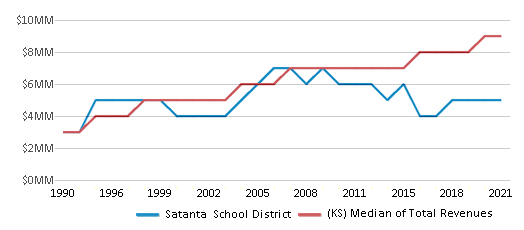
Spending
$5 MM
$8,211 MM
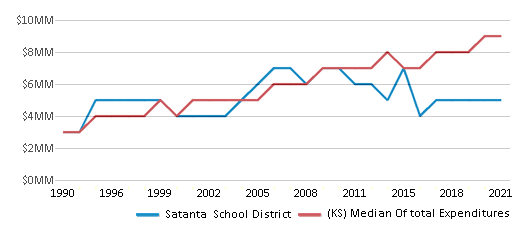
Revenue / Student
$21,459
$16,276
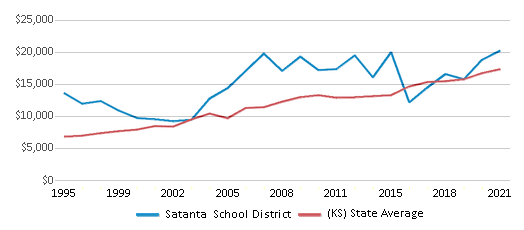
Spending / Student
$20,016
$17,192
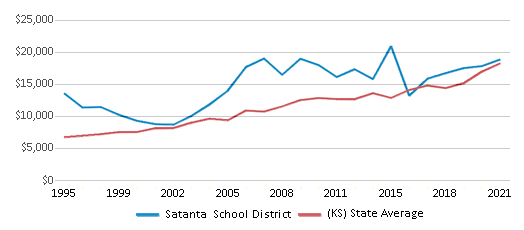
Best Satanta School District Public Middle Schools (2025)
School
(Math and Reading Proficiency)
(Math and Reading Proficiency)
Location
Grades
Students
Rank: #11.
Satanta Jr-sr High School
(Math: 15-19% | Reading: 15-19%)
Rank:
Rank:
2/
Bottom 50%10
100 Caddo
Satanta, KS 67870
(620) 649-2611
Satanta, KS 67870
(620) 649-2611
Grades: 6-12
| 114 students
Recent Articles

Year-Round Or Traditional Schedule?
Which is more appropriate for your child? A year-round attendance schedule or traditional schedule? We look at the pros and cons.

Why You Should Encourage Your Child to Join a Sports Team
Participating in team sports has a great many benefits for children, there is no doubt. In this article you will learn what those benefits are.

White Students are Now the Minority in U.S. Public Schools
Increasing birth rates among immigrant families from Asia and Central and South America, combined with lower birth rates among white families, means that for the first time in history, public school students in the United States are majority-minority. This shift in demographics poses difficulties for schools as they work to accommodate children of varying language abilities and socio-economic backgrounds.





